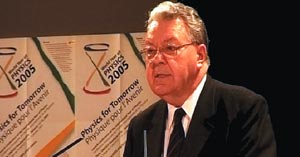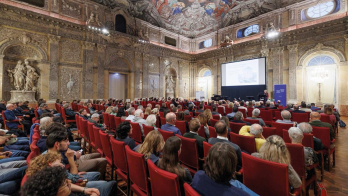More than 1000 people including eight Nobel laureates and close to 500 students from 70 countries took part in the Physics for Tomorrow conference in Paris on 13 January. The event took place at the headquarters of the United Nations Educational, Scientific and Cultural Organization (UNESCO). It marked the official launch of the International Year of Physics proclaimed by the UN, which aims to highlight the importance of physics and its contribution to society.

The conference was organized by UNESCO, the lead UN organization for the International Year, together with other organizations from the physics community, including the CNRS and CEA in France and CERN. CERN itself was founded under the auspices of UNESCO, which is one of the observer organizations to the CERN council, so it was appropriate that Carlo Rubbia and Georges Charpak, Nobel laureates from CERN, together with the director-general, Robert Aymar, were among the invited speakers.
During the opening ceremony, Aymar emphasized the crucial roles of physics as the driving force for innovation, as the magnet for attracting and training the most talented people, and in forging partnerships of nations. Rubbia participated in the round table on “What can physics bring to the socio-economical challenges of the 21st century?” and Charpak talked about “Teaching and education in physics”.
• This inaugurated a series of events that are taking place all over the world in 2005 to celebrate physics and emphasize its role. For further information see www.wyp2005.org.








